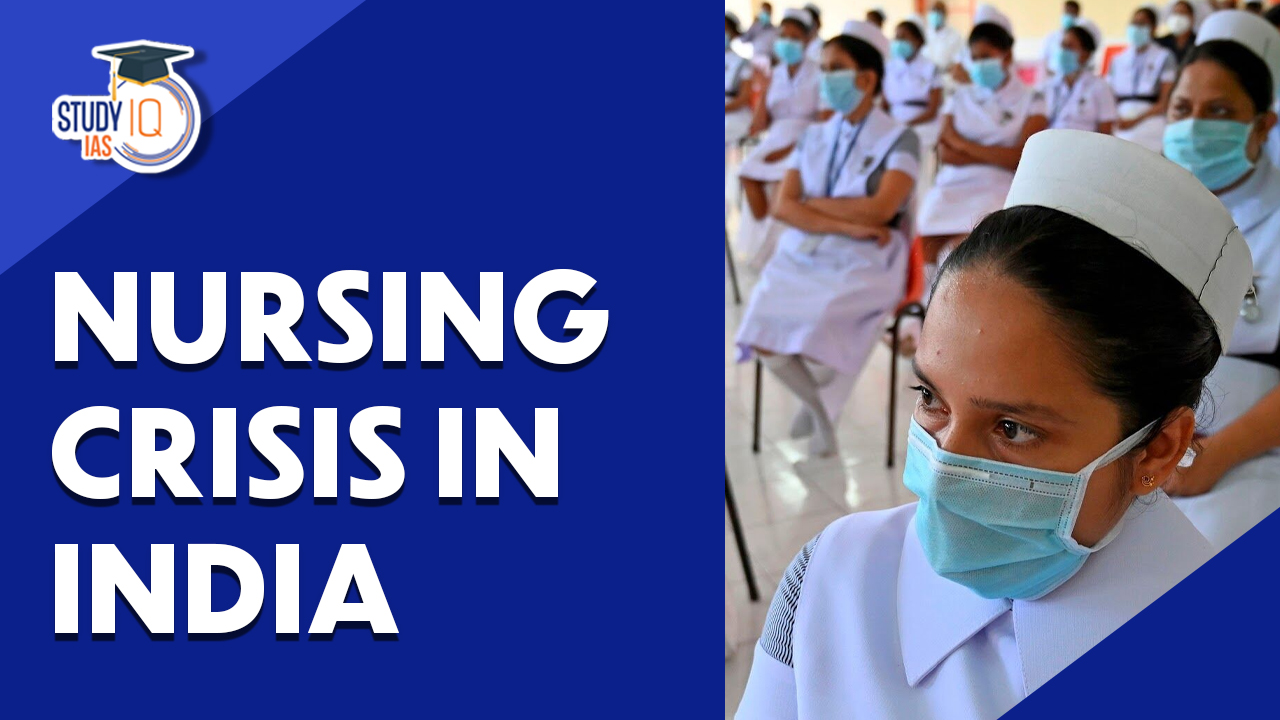Table of Contents
Context: According to the data from Health Ministry, there are no nursing colleges in 40 percent of districts across India.
Key Highlights of the Data
- Shortage of Nurses: India currently has close to 35 lakh nurses, but its nurse-to-population ratio is only 2.06:1000 against a global benchmark of 3:1000.
- Regional Disparities: Though there has been a 36% growth in the number of institutions offering undergraduate nursing education since 2014-15, resulting in a 40% growth in nursing seats, there is a regional skew within these statistics.
- There are no nursing colleges in 40 percent of districts across India.
- About 64% of the nursing workforce is currently trained in just eight States.
- 42% of nursing institutions are concentrated in Andhra Pradesh, Karnataka, Kerala, Tamil Nadu, and Telangana, while 17% are in the western States of Rajasthan, Gujarat, and Maharashtra.
- Only 2% of nursing colleges are in the northeastern States.
- Growth of Nursing Colleges vis-à-vis Medical Colleges: The growth of nursing colleges also lags far behind the 81% growth rate of medical colleges, with the number of undergraduate and postgraduate medical seats surging at 110% and 114%, respectively, since 2014-15.
Nursing and its Significance in Healthcare
- Nursing is a healthcare profession that focuses on the care of individuals and their families to help them recover from illness and maintain optimal health and quality of life.
- Nurses are distinct from other healthcare providers as they have a wide scope of practice and approach to medical care. They play a vital role in ensuring that patients receive the best treatment and care.
- According to the WHO, approximately 27 million men and women make up the global nursing and midwifery workforce, accounting for nearly 50% of the global health workforce.
Reasons for the Shortage of Nurses in India
- Lack of Nursing Colleges: Lack of institutions offering nursing education makes it challenging for aspiring nurses from these regions to access proper training and education.
- Inadequate Training Infrastructure: Even in states with nursing colleges, the quality and capacity of training infrastructure may not be sufficient to meet the demand for nursing education.
- Limited Awareness and Perception: Nursing is still often perceived as a less desirable career option compared to other professions in the medical field, such as becoming a doctor. T
- Working Conditions: Nurses in India often face challenging working conditions, including long working hours, less remuneration and high patient-to-nurse ratios.
- Migration of Nurses: Many qualified nurses from India choose to seek better opportunities and higher salaries abroad.
Government Initiatives
- Scheme for Setting up of Nursing Colleges: The Central government has announced a scheme in April 2023 to set up 157 new nursing colleges co-located with medical colleges in the next two years, with financial support of ₹10 crore a college.
- The scheme is aimed at correcting the regional disparities in the distribution of nursing colleges across the states and districts in India.
- Guidelines to improve Working conditions: The Union health ministry has issued draft guidelines, proposing annual health check-ups, a creche facility and work hours not exceeding 40 in a week, among other measures, to improve the working conditions of nurses in all healthcare institutions.
- It has also recommended that all healthcare establishments may, as far as possible, provide accommodation to their nursing staff within or near their premises.
- The International Council of Nurses: It is a federation of more than 130 national nurses’ associations, of which India is a part. was founded in 1899 and has its headquarters in Geneva, Switzerland.
Way Forward
- The Indian government’s decision to set up 157 new nursing colleges is a positive step in addressing the healthcare crisis in the country. However, it is essential to ensure that the education imparted in these colleges is of high quality, and students have access to the latest technologies and trends in the field.
- It is equally crucial to ensure that nursing professionals are given proper communication training, familiarized with rapidly changing technologies in medical care, and equipped to work autonomously.
- Additionally, the upskilling of nurses to take on leadership positions must be done through continuous training.
- The nursing curriculum in India needs to be revamped to ensure that it is in line with the latest healthcare trends and technologies.
- Institutes should focus on providing theoretical and practical knowledge to nursing students, covering all aspects of healthcare, including geriatric care, pediatrics, and critical care.


 Daily Quiz 19 April 2025
Daily Quiz 19 April 2025
 Vehicle-to-Grid (V2G) Technology and its...
Vehicle-to-Grid (V2G) Technology and its...
 Waqf Act (Amendment) 2025: Key Highlight...
Waqf Act (Amendment) 2025: Key Highlight...





















